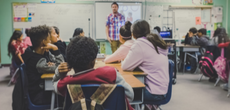A World of Choices – Preparing Young People for the Future of Work
Interview With Mark Beckles - Vice President, Social Impact and Innovation At RBC
RBC and RBC Foundation have been long-time partners of JA in Canada, supporting the development and scaling of career readiness programs aimed at equipping youth for the future of work. RBC’s partnership has specifically enabled JA Canada to focus on the trades. In the Spring of 2024, The Globe and Mail interviewed Mark Beckles, Vice President, Social Impact and Innovation at RBC to learn more about the partnership. Read on for the interview to learn how together we are empowering youth with the necessary skills and knowledge to be successful in their careers through World of Choices and Skilled Trades Summits.
What are the mandate and goals of RBC Future Launch?
The goal of RBC Future Launch is to prepare young people for the future of work and specifically the jobs of tomorrow. That stems from the fact that we recognize Canada’s economic prosperity and future is directly linked to the extent to which we can prepare young people to succeed in an ever-changing global economy.
We recognize when young people succeed, Canada succeeds; and that by investing in young people and equipping them with skills for a thriving future, we can ensure Canada's economic prosperity.
For the past decade, Canada’s GDP growth has trailed its G7 competitors due in part to the mismatch between the skills young people are graduating with from college and universities and the kinds of skills and experiences needed to super-charge our key productive sectors. By ensuring that young people have access to those skills and opportunities and know where they are, they can transition from school to work and find meaningful employment in the process, and if we do this well, we will have empowered Canadian youth in the way in which we intend.
How does the World of Choices Program suite align with RBC Future Launch?
RBC Future Launch is focused on three priority pillars. The first pillar is skills development. The notion of skills development and helping young people gain relevant skills, knowledge and credentials to better position themselves for the future really aligns to the World of Choices program and is core to what RBC Future Launch is all about.
The second is networking and helping young people to connect with the right relationships, mentors and resources to grow and sustain their network. And the third is practical work experience and helping young people understand different job experiences and build opportunities to showcase their own talent. When you think of networking skills and practical experience that really aligns well to JA Canada's World of Choices program.
Why has RBC put an emphasis on skilled trades? Why now?
There is a lack of understanding and awareness of the role that skilled trades play in helping to fuel Canada’s economic prosperity and moreover, there is a lack of education and exposure to what those opportunities look like. There is a real deficit in terms of the number of skilled tradespeople that are able to help advance and drive competitiveness in the Canadian economy.
When you break it down by demographic; in addition to there being a lack of skills trades professionals across the country, there's also under representation in terms of BIPOC youth and women, in particular.
Then you add the intersection of green skills and skills trades and as we move toward a greener economy, we acknowledge that skills trades professionals need to develop new skills as you think about creating infrastructure to support electric vehicles or retrofits for homes that are trying to green their environments.
Those are some of the reasons why we’re emphasizing skills trades and why we’re doing it now.
What impact are you seeing as a result of these programs?
We are proud of the outcomes that we hear directly from the program participants. When you hear directly from the program beneficiaries that they found value in the learning opportunity, that’s when you know that the partnership is working well. Particularly among diverse youth and women, hearing them talk about actively considering a career in skills trades to secure Canada’s future prosperity is really powerful. And it’s all the more inspiring when they tell us that through practical work experience, they’ve been able to transition into the trades whether now apprenticing or taking a college program in plumbing, electrical, or carpentry. These examples of people pursuing the skilled trades with a sense of pride and intentionality, and who are making a really good living demonstrate that we are contending with the stigma around skills trades, and changing the perspective of how skilled trades are perceived.
What are RBC Foundation’s hopes for youth?
RBC’s new Purpose Framework defines the societal challenges that RBC Foundation wants to help address. With a rapidly changing workforce, we will help equip people with skills for a thriving future. We want to ensure that youth feel more empowered for the jobs of tomorrow and support them as they access jobs that secure them financially, secure their families financially and secure their communities financially.
When surveyed, nearly 80 per cent of young people ages 18 – 29 told us that they felt better prepared for the future of work. Outcomes from the World of Choices program contributed significantly to that state of preparedness. That’s how we know that these programs are working and having the desired outcomes.
The World of Choices program supports general career exploration and provides the ability to scale programs that are focused on the skilled trades and allows young people to attend summits or learn through the online skills trades content center. It is phenomenal what this program delivers and that it is having the impact that we believe aligns to the larger goal of preparing young people for the future of work. Congratulations to JA for standing up this impactful program!











